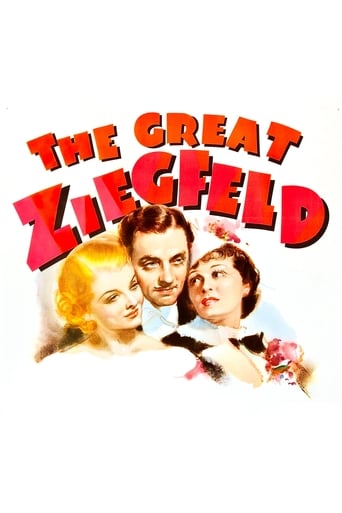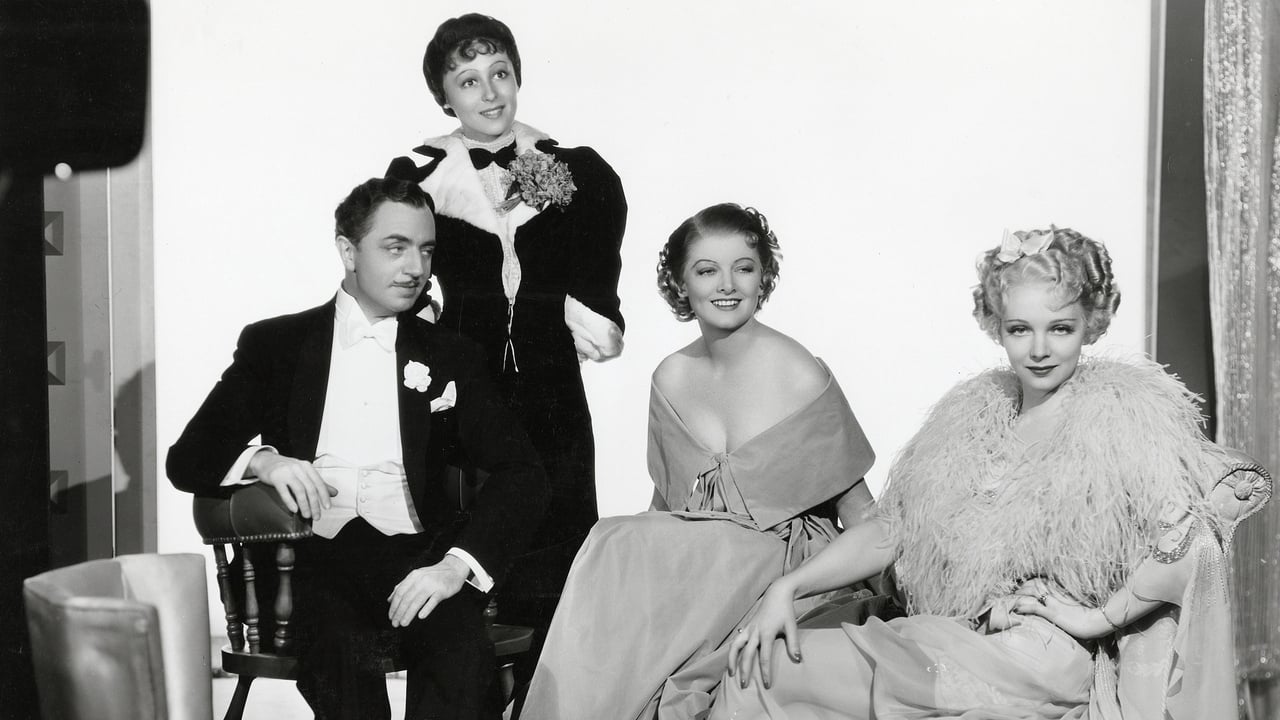utgard14
MGM's epic biopic of theatrical producer Florenz Ziegfeld, starring William Powell in the title role. As with most Hollywood biopics, liberties are taken with the facts. Since this was made in the Golden Age of Hollywood, the intention is to portray Mr. Ziegfeld in the best possible light. If it were made today, the opposite would be true and all his faults would be emphasized (probably to the point of slander). I'll leave it to you to decide which is the better approach. Anyway, the movie covers Ziegfeld's rise as a Barnum-esque showman to becoming one of Broadway's most successful producers with his Ziegfeld Follies show. Along the way he attracts many women and marries two of them (Luise Rainer, Myrna Loy).It's a spectacle made in the grand Old Hollywood fashion, heavy on melodrama and lavish musical numbers. Powell is fine in the lead. I have no idea how closely he "gets" Ziegfeld here, as he seems very much like William Powell's usual screen persona to me. He would reprise his role as Ziegfeld a decade later in 1946's Ziegfeld Follies (also from MGM). Luise Rainer is terrific in her Oscar-winning role as Ziegfeld's first wife, Anna. Myrna Loy is a little miscast as Billie Burke but it's hard to argue against any opportunity to see Powell and Loy on screen together. The rest of the cast includes solid supporting players Frank Morgan, Virginia Bruce, Ray Bolger, Reginald Owen, and Nat Pendleton. A. A. Trimble does a spot-on impersonation of Will Rogers.It is a bit overlong. The first half could have done with some trimming. Still, a fine cast keeps things interesting and those musical numbers are dynamite. Dennis Morgan's "A Pretty Girl is Like a Melody" number is one of the highlights. The film was nominated for seven Academy Awards with three wins, including Best Picture and Best Actress for Rainer. Its award wins are the subject of debate for some today, who argue it is one of the least-deserving Best Picture winners. That's kind of laughable when you think about it, as the Best Picture Oscar rarely goes to the most deserving film. That was true then and is even more true today, in my opinion. It's definitely something you'll want to try out if you are a fan of classic Hollywood and all its glitz and glamour. They don't make 'em like this anymore.
mark.waltz
The Broadway legends total a great many, and fans argue over who was responsible for the transition of the old fashioned entertainments of the 19th century into what is now known as musical comedy. Certainly the many song writers of this time (George M Cohan, Irving Berlin, Jerome Kern, Rodgers and Hart, Cole Porter, George and Ira Gershwin) had some impact on the creation of the modern world of American musical theatre, but it really was one man who transform the New York theater into what remains to this day.Florenze was already a show man when he had the idea of taking his low class burlesque shows on to the mainstream on Broadway where operetta and serious dramas were the main source of entertainment. His Follies between 1907 and 1931 gave way too many elaborate imitators, but he did it first and according to legend, did it best.Ironically, it was one of the dream makers of Hollywood who saw the potential in Ziegfeld's story being taking to the screen. MGM Studios, under the run of Louis B. Mayer with his artistic partner Irving Thalberg, had the dream that MGM had more stars in the were in heaven, a theme that Ziegfeld may have felt. Ziegfeld himself had Will Rogers, Eddie Cantor, W.C. Fields and an all but now forgotten singer and dancer named Marilyn Miller as his leading lady. In the midst of all that, he found a funny looking Jewish girl named Fanny Brice and took her out of burlesque turning her into one of the most popular stars ever to cross the Broadway stage. Yes, that is the same Fanny Brice who was later portrayed by Barbra Streisand, so The Great Ziegfeld in a sense is a prequel to the classic stage and movie musical Funny Girl.But this is the Ziegfeld story, and to play him, MGM cast one of their top leading men, William Powell. It was too years after the success of The Thin Man so his leading lady, Myrna Loy, cast as Ziegfeld's second wife, Billie Burke. However, it is the actress playing his first wife, NFL, who got the attention and an Academy Award. That is Louise Rainer who had a brief run as a leading lady at MGM, winning to Academy Awards before leaving out of discontent. Rainer gives an excellent performance, although I debate her qualifications as leading actress for this film. Rainer is excellent in several things, particularly the one where after having discovering her husband's infidelity and later divorcing him, calls him to congratulate him about his second marriage.The bulk of the story focuses on his constant financial issues and this rivalry with fellow producer Frank Morgan who eventually becomes his closest supporter and keeps bailing him out. Then there are the musical numbers which would never fit on a Broadway stage. Still, these numbers are so elaborate and fantastic that I found myself tearing up in spite of having seen this a bunch of times. Of course, A Pretty Girl is Like a Melody is the most famous, but it's also difficult not to remember You Got to Pull Strings and You've Never Looked So Beautiful Before. In addition to Brice, Ray Bolger plays himself. An ironic moment has him telling Powell that he didn't have his heart in doing just props, an interesting look into the future when he turned down the opportunity to be the Tim Man and searched for a brain instead.The facts have been altered a little bit with Virginia Bruce's drunken chorus girl given a different name as well as the one based upon Marilyn Milker. Snippets of a few shows make it in bit you can't have everything. While this won the Oscar for Best Picture, I still think that Universal's Show Boat is better and practically flawless. Still, this is quite a triumph in its own way, and director Robert Z. Leonard would almost top it with a semi- sequel, Ziegfeld Girl that only mentions the great producer. Years later, Paul Henreid would play Ziegfeld in MGM's musical biography of Sigmund Romberg and Walter Pidgeon would argue with Streisand after she slipped a pillow into her costume in Funny Girl. Powell played Ziegfeld one more time, however, in 1945's elaborate version of what MGM thought the Follies would look like on screen.
SnoopyStyle
During the 1893 Chicago World's Fair, sideshow barker Flo Ziegfeld Jr. (William Powell) struggles to promote strong man Eugen Sandow. He beats his rival Billings by smart marketing on Sandow. It's the start of his long career of promoting vaudeville acts as he gains success and loses big over and over again. His first wife is French star Anna Held (Luise Rainer) who he signed stealing away from Billings. She gains publicity with Flo sending 20 gallons of milk for a fictional beauty treatment everyday. His next star is the alcoholic Audrey Dane who breaks up his marriage. Borrowing from Billings again, he produces a new show with Broadway star Billie Burke (Myrna Loy) and later marrying her and having daughter Patricia.This is a long giant Hollywood extravaganza to proclaim its love of Ziegfeld. It has all the lavish production that such a thing entails. It can get long-winded at 3 hours but it's not a small life. In fact, it fits the man to have a long big production. It does bring out the up and down life of a vaudeville hustler and the old idea that bigger is always better. It's the perfect big production for the producer who loves big production. William Powell does a fine impresario of hucksterism and imagine making.
Vonia
"The Great Ziegfeld", an autobiography of the eponymous Florenz Ziegfeld Jr., was a great success in its time. At almost three hours long, the film illustrates pretty much the man's entire career, from the 1893 World's Fair until his death in 1932. Chronicling his relationship with various acts and his creative use of marketing to win over rival Jack Billings (Frank Morgan), we also watch his romantic interest in Anna Held (Luise Rainer) develop, whom was initially an act he signed on. After the two of them marry, in 1907, his most famous and successful production, "The Ziegfeld Follies", begins.One of the themes in Ziegfeld's life is his need for more shows, more success, more glitter and glam. This is both his crowning glory and his downfall, as it leads to his great successes, but also to his eventual end. He is always looking for more acts, more girls to fall in love with, more audiences to impress. By 1913, Anna has decided to file for divorce. Always the playboy, Ziegfeld soon marries another actress, Billie Burke (Myrna Loy), and they have a daughter. As times change and live stage shows become less popular. Ziegfeld is forced to borrow, then partner with his former rival. Various scenes are unnecessary (especially those of the early years in his career, as he tries to begin a relationship with Anna Held (Luise Rainer)), as well as the numerous lavish dance and song numbers, which are entertaining at first, but all blend together as one by the end of the film. The real life man is best known for "The Ziegfeld Follies," also the best produced aspect of the film. About thirty minutes of footage from this production are illustrated. Other notable scenes include Ziegfeld facing bankruptcy during The Great Depression, eliciting an emotional moment for the audience. The dramatized version of his death in the closing scene is also notably representative of the man's entire life and career, although obviously unreal. Ziegfeld hallucinates his "glory days", his last words being, "More steps. Higher! Higher! Higher!". Entertaining at times, but much too long, this film accurately describes an iconic man. The problem is that with his real-life wife overlooking production, the accurate characterization was missing the flaws every man has. The result is a film that seems all to much like fiction.



 AD
AD



